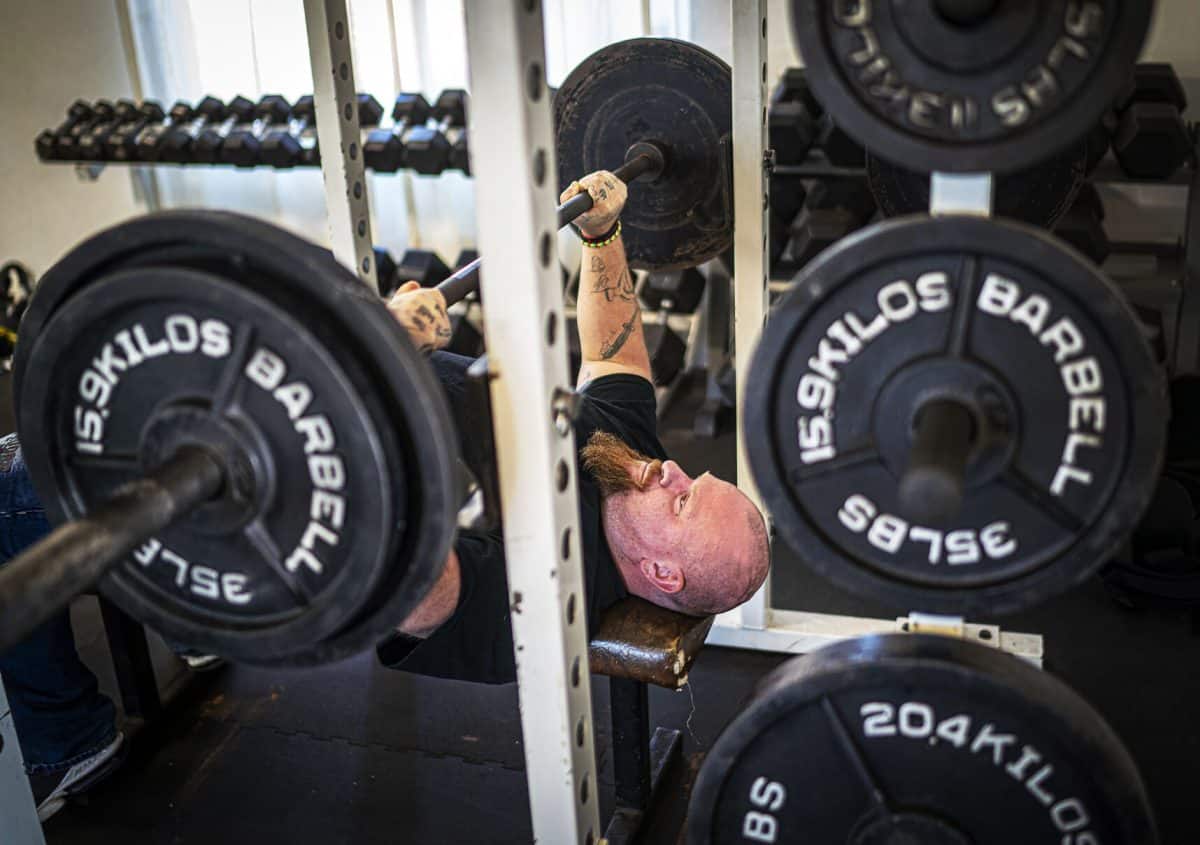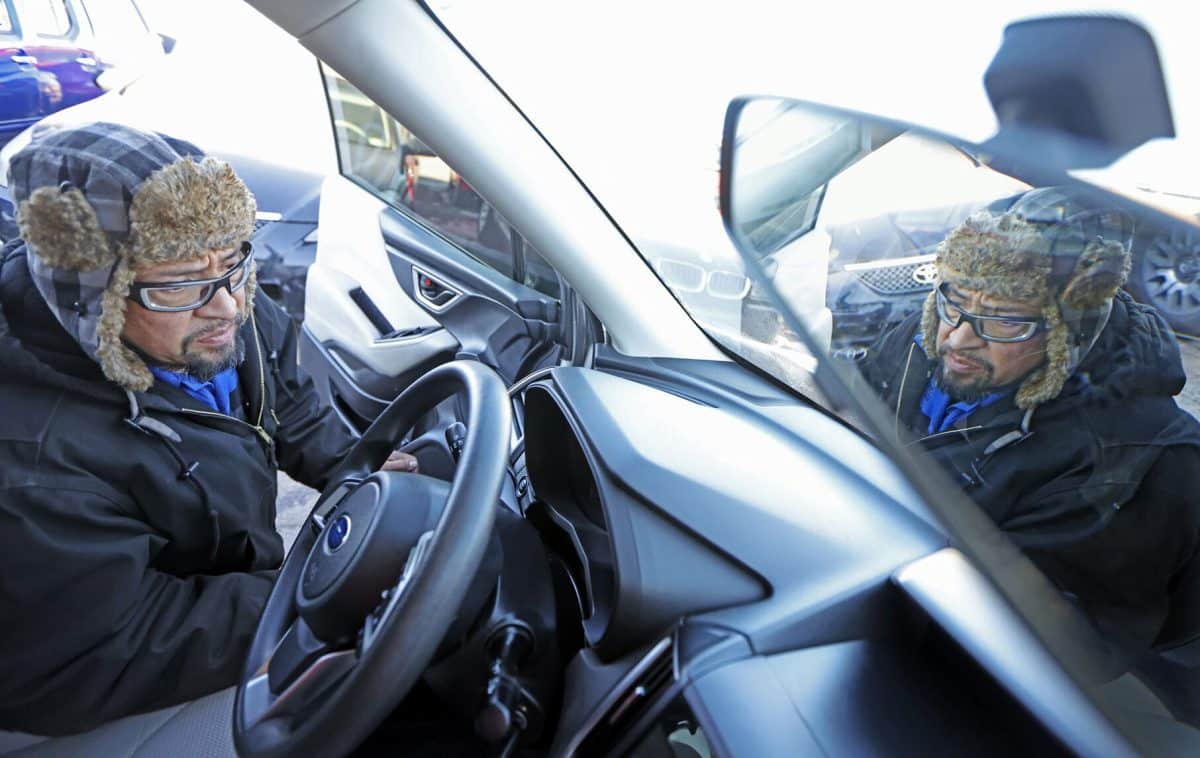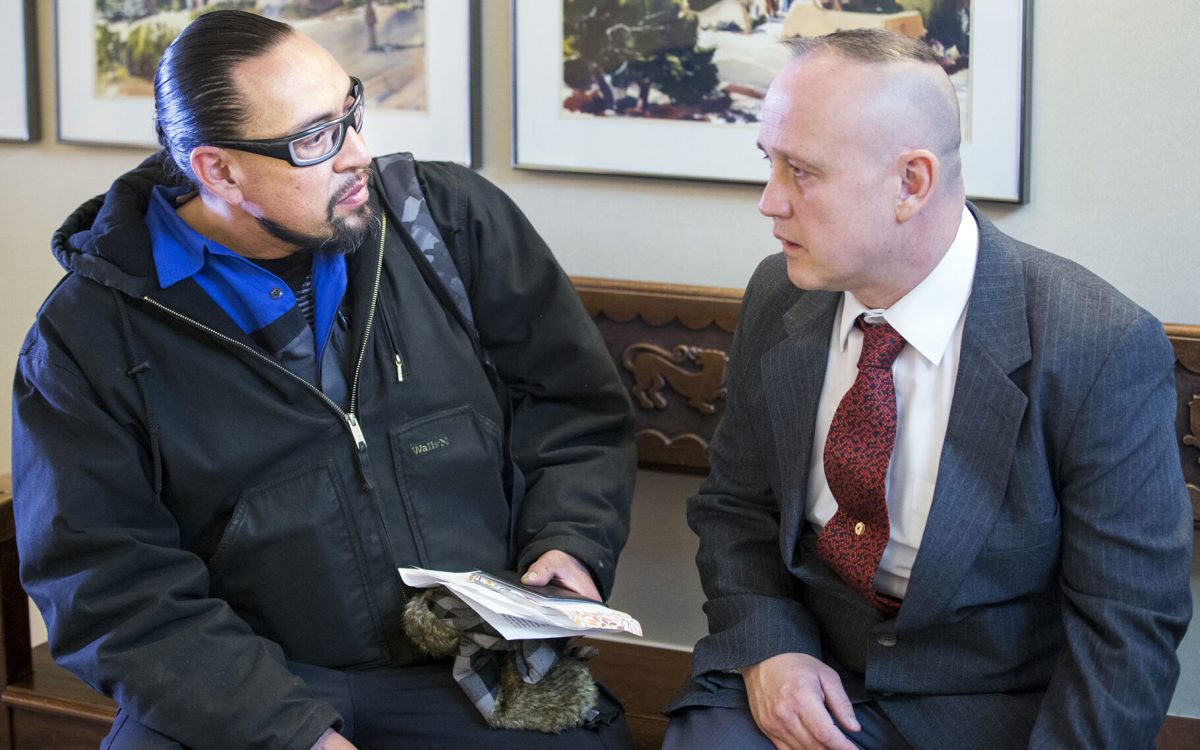 Matthew Pettit lifts weights Friday at the gym at the Endorphin Power Company, a transitional housing community in Albuquerque for those homeless as a result of substance abuse. Gabriela Campos/Santa Fe New Mexican
Matthew Pettit lifts weights Friday at the gym at the Endorphin Power Company, a transitional housing community in Albuquerque for those homeless as a result of substance abuse. Gabriela Campos/Santa Fe New Mexican
 Adam Griego performs diagnostics on a vehicle Thursday at Great Little Cars. Griego, a 50-year-old Santa Fean, is unable to vote after serving two years on a drug charge. Luis Sánchez Saturno/Santa Fe New Mexican
Adam Griego performs diagnostics on a vehicle Thursday at Great Little Cars. Griego, a 50-year-old Santa Fean, is unable to vote after serving two years on a drug charge. Luis Sánchez Saturno/Santa Fe New Mexican
 Adam Griego speaks with Justin Allen on Tuesday during a press conference at the Capitol to announce legislation to restore voting rights for felons. Luis Sánchez Saturno/Santa Fe New Mexican
Adam Griego speaks with Justin Allen on Tuesday during a press conference at the Capitol to announce legislation to restore voting rights for felons. Luis Sánchez Saturno/Santa Fe New Mexican
By ROBERT NOTT
The Santa Fe New Mexican
Adam John Griego is dreaming of the day he can vote again.
The 50-year-old Santa Fean, who spent two years in prison for a felony drug possession charge, anticipates how it will feel when he can finally cast a ballot once more: “Liberating,” he said. “Like freedom.”
That’s important for a man who has been free for more than two years but still feels incarcerated in so many ways, he said during a break from working on a vehicle at Great Little Cars in Santa Fe.
“It’s weird because you come out of prison and you feel like you’re still in prison, if that makes sense, because there’s always someone watching you,” he said, his eyes searching for something — acceptance, perhaps — as he shared the circumstances leading to his fight to restore voting rights to felons after they get out of prison.
“There’s a paranoia attached to it,” he said.
Recalling the many doors that first opened — jobs, housing opportunities, a chance to buy a vehicle — and then shut after a background check came through, he said he is now working to help others like him regain a sense of right.
Such as restoring their right to vote.
State law now denies the right to vote to incarcerated felons and those released on probation or parole.
A voting rights bill introduced Friday could change all that. Among other measures, House Bill 4, sponsored by four Democratic lawmakers, would give felons the chance to register to vote or update an existing registration upon release or “during the reentry phase of an inmate’s sentence.”
Felons serving prison sentences would not be eligible.
Previous legislative efforts to restore voting rights to felons have failed. Griego said he hopes this year it goes through. A regular voter before his incarceration, he wants to cast a ballot again in the 2024 election cycle.
“Voting rights is about restoring democracy,” he said. “I don’t understand government setting up barriers for anybody to vote.”
He’s one of several former felons now acting as advocates for HB 4. Interviews with others — all of whom share a common background of substance abuse — indicate they would like to win something from the Legislature and the community that’s perhaps more valuable than voting rights: forgiveness and a shot at a second chance.
Voting is “like welcoming people back into society and letting people know that we belong here,” said Justin Allen, a 48-year-old Albuquerque resident who served 17 years in the New Mexico prison system.
For Albuquerque resident Alayne Ballantine, who served five years in prison in Texas, a vote is a validation. “You come back from being incarcerated and you are trying to do better, trying to be a part of society again, and there’s all these barriers, things you can’t do to really feel truly like you are back at home,” she said.
Ballantine, who is about to turn 30, said having the right to vote would allow her and other felons to advocate for those left behind bars.
Matthew Pettit, 37, gets that. He spent about 11 years in prison in New Mexico. Now working for Dedicated Outreach and Prevention Education, better knows as D.O.P.E., a nonprofit that offers social services, health care and other support to people in need, Pettit said a vote would give him “connection to the community and a seat at the table” to help others coming out of the prison system.
Like Griego, Pettit found it difficult to find housing or a job upon release.
Ballantine had trouble landing a job, too, but had an easier time finding housing because some relatives had a place she could rent.
Eventually, through volunteering for some Albuquerque-based nonprofits, Pettit landed the job at D.O.P.E. and found himself a home in a sober-living facility.
Entering the prison system, he said, was like “a crash course on a battleground.”
His prison background helps him connect with the folks he aims to help. “With D.O.P.E. services, we deal with harm reduction, the homeless, and it takes a certain type of person to be comfortable in those environments, which I’m totally fine with,” Pettit said.
Still, he sees how some people immediately size him up and judge him based on his tattoos and a countenance that suggests he’s weathered a war.
He said he never registered to cast a ballot before his time in prison. Now he realizes the value of a vote.
Wanting their voice back
New Mexico law allows restoration of voting rights for people convicted of felonies who complete their sentences and all the conditions of their probation or parole. Allen has earned the right.
“It meant I was no longer state property,” Allen recalled of voting again after so many years away from a ballot machine. “It meant I was a citizen.”
According to a 2022 report by the nonprofit Sentencing Project, 48 states have laws that ban people with felony convictions from voting. In 2022, an estimated 4.6 million Americans were ineligible to vote due to these laws or policies, “many of which date back to the post-Reconstruction era,” the report said.
Griego has become something of a poster child for the move to restore voting rights for felons in New Mexico. Over the past six months or so he has shown up to testify at interim legislative hearings and taken part in news conferences about the issue at the state Capitol and elsewhere.
Without going into too many specifics about his past, he said it’s fair to say he came from a troubled home. He experimented with alcohol and drugs at a young age. He said he was an alcohol and cocaine addict for 20 years and suffered the loss of his parents and divorce from his wife. Other challenges also led him to make some bad decisions in his 40s.
He came out of prison in September 2020 feeling uneasy, unsure of who he was and well aware he no longer had any material goods and maybe not many reliable friends. He had no credit, no job, no wheels. Then living in Washington state, he was turned down for about a dozen jobs after employers learned he had a criminal record.
He reached out to old friends from the days when he lived in Santa Fe years ago — Tim and Joy Johnson, who run Great Little Cars. They did not hesitate to offer him a job, he said.
The Johnsons said they have total faith in Griego, who also works at a Subaru dealership in the city and teaches at Santa Fe Community College.
Keeping “over busy “ is good for him, he said.
He also volunteers for the American Civil Liberties Union of New Mexico, which is how he got involved in the push to expand voting rights.
“He went down a path that he probably shouldn’t have,” Tim Johnson said of Griego. He credited Griego with getting sober and working enough to buy a house in Santa Fe.
“He rehabilitated himself,” Johnson said. “I think that’s more important than somebody else trying to do it.”
Griego’s smile can make you think all is well when he talks about moving forward.
Looking back is not so easy, though. Asked to recall the dreams for the future he had as a little boy, he paused, let out a long sigh, and said, “That’s a tough question because I haven’t been little for a long time.”
He said he takes responsibility for his actions. He just wants people to understand that people coming back from doing time need signs of support.
He wonders how many felons on probation or parole would take advantage of HB 4 if it passes. He doesn’t see many others showing up for rallies.
He tries not to think about how others might view him or judge him for his past.
“Being Christian, you already know my judge is …”
He looked up and pointed to the heavens.
He flashed a smile.
Did you know, he asked, that New Mexico’s state slogan is, “Everybody is somebody in New Mexico”?
But when you’re convicted of a felony and lose your right to vote, “you are no longer somebody,” he said. “You’re just a body.”

